- Home
- Sharon M. Draper
Stella by Starlight Page 8
Stella by Starlight Read online
Page 8
“Then let us pray,” Pastor Patton said firmly. Stella noticed a few townspeople slowing down as they passed by; none of the faces looked pleasant. She closed her eyes. “Dear Lord,” said the pastor, “we bow down before you as we stand up for dignity. Be with us and protect us both morning, noon, and night. Amen.”
Papa tucked in his shirt and brushed a speck off his shoes. Stella was all the more aware of her bare feet, but she walked in with as much dignity as she could when the pastor opened the door to that office.
“What y’all boys want?” a burly, bearded man asked as they approached his desk. The man’s shirt was wrinkled and stained with sweat under the arms, and Stella could see bits of the egg he must have had for breakfast in his beard. A metal name plate sat on his desk in front of a large pile of papers, both typed and handwritten—AMHERST PINEVILLE, REGISTRAR.
Stella’s father stiffened at the word “boys,” his face going hard, but Pastor Patton told the man calmly, “We have come to register to vote in the presidential election to be held on November eighth.”
“Too late,” Mr. Pineville said with a shrug. “Registration done closed a month ago.”
Pointing to a sign above the man’s head, the pastor said patiently, “That there poster says today is the last day of registration, and we are here to register.”
Mr. Pineville sighed. “Do all of y’all know how to read?”
“Yes, sir. We read that poster, didn’t we?” Mr. Spencer replied, his voice tinged with anger.
“Watch it, boy,” Mr. Pineville warned. “Does Sheriff Sizemore know y’all are here in town causin’ trouble?”
“We are not causing trouble, and I’m sure the sheriff has more important things to do than worry about where we are spending our day,” Stella’s father replied.
Another sigh. “Can y’all write?”
“Yes, sir—all of us,” Pastor Patton said evenly.
“You gotta pay a fee,” the registrar warned.
“We are prepared to pay.” Papa’s reply was as even as the pastor’s.
“And you gotta pass a test—about the Constitution of the United States.”
“We teach our children about the Constitution and the Declaration of Independence in our schools,” Stella’s father said. “That’s how we know about our rights.”
Mr. Pineville tapped his pencil against his desk, his eyes narrowing. “Y’all ain’t deservin’ of no rights.”
“This is my eleven-year-old daughter, Stella,” her father said, placing his hand on her shoulder. “Stella, can you recite for Mr. Pineville here what you learned in school last week?”
“You mean that section of the Declaration of Independence that Mrs. Grayson had us memorize?”
“Yes, child. Show the man.”
Recitation was a huge part of the lessons at her school. Even the little ones could rattle off long passages from the Bible, the Declaration, and the Constitution. Stella took a deep breath and spoke without hesitation.
“ ‘We hold these truths to be self-evident, that all men are created equal, that they are endowed by their creator with certain unalienable rights, that among these are life, liberty, and the pursuit of happiness. That to secure these rights, governments are instituted among men, deriving their just powers from the consent of the governed. That whenever any form of government becomes destructive of these ends, it is the right of the people to alter or to abolish it, and to institute new government, laying its foundation on such principles and organizing its powers in such form, as to them shall seem most likely to effect their safety and happiness.’ ”
Her father beamed. Stella tried not to show how satisfied she felt.
“So what?” Mr. Pineville smirked, seemingly unimpressed. “I’ve seen a trained monkey that can count to three!”
“My daughter is not an animal, sir,” her father said sharply.
“You watch your tone, boy, or I’ll throw all of y’all out of here,” Mr. Pineville warned. He pulled three sheets of paper from the pile in front of him. “Answer these questions. You got fifteen minutes. And don’t be gettin’ any answers from your pet monkey!” He leaned back and laughed.
Stella swallowed hard. She’d never been called an animal before. She certainly wasn’t going to let that man make her cry, however, so she focused on her father’s bushy eyebrows, so like her own. She bit her lip and stared at those eyebrows, and those brown eyes beneath them that looked at her with such love and assurance. I am a stone. I am a stone, she thought fiercely.
The heat had risen on her father’s face as well, but Pastor Patton firmly guided him to a counter on the far wall before he could respond. There was nothing to write with at the counter.
Mr. Spencer dug into his pants pocket and pulled out three pencils. “I come prepared,” he said with a shrug.
Stella leaned over and read some of the questions as her father went through the test.
1. Name the attorney general of the United States.
2. What is a tribunal?
3. What is a treaty?
4. What officer is designated by the Constitution to be president of the Senate of the United States?
5. Write the preamble of the Constitution of the United States.
While the three men wrote their answers, two others, white men, sauntered into the office. “Hey, Amherst,” the tall, skinny one said. Stella recognized him. He was one of those fellows who was always sitting on the benches outside the general store in Bumblebee, playing checkers or sleeping. He liked to yell at her and her classmates as they left the candy store, sometimes calling them names.
“Well, if it ain’t Johnny Ray Johnson! What y’all up to?”
“Me and Maxwell Smitherman here come to sign up to vote.”
Stella tried not to stare. Mr. Smitherman! He was a foreman at the mill. She took in his patent-leather shoes and his gold pinkie ring. So this was the man her father’s friends complained about—his unfairness and downright meanness. Why, he was the one who made Mr. Winston, who had showed up one minute late to work one day, take a load of logs out of a wagon and carry them on his back instead. It had taken him long past midnight to finish. None of the other men had been allowed to help.
“That’s my job,” Mr. Pineville was saying amiably. “Just sign your name on this here form, and you’re all set!”
“That’s it?” asked the man called Maxwell.
“That’s it. Just sign on this here line, and I’ll see you on Election Day.”
Stella’s father instantly shot an angry look in Mr. Pineville’s direction. The pastor frowned at him, and he returned to the test reluctantly.
But the man named Johnny Ray was now staring at them. “What you got goin’ here this morning—coon school?” he asked.
Mr. Pineville and Mr. Smitherman laughed. “Naw, they think they gonna vote next month. They takin’ the test.”
“You ever have one of ’em pass it?” Mr. Johnson asked.
Mr. Pineville guffawed. “Most of the time they too stupid to write their names.”
Maxwell Smitherman strolled over and poked Mr. Spencer in the side. “Ain’t you s’posed to be over at the mill sweepin’ up, boy?”
Mr. Spencer raised his chin. “I took the morning without pay, sir,” he managed to say. “I aim to work overtime tonight to make up for it.”
Smitherman snarled, “Don’t plan for any pay for the rest of the week, boy! You don’t choose your hours—I do!”
“Yes, sir,” Mr. Spencer choked out. Stella could tell he was about to explode, but Pastor Patton placed a calming hand on his shoulder.
Smitherman must have tired of harassing them, because he abruptly turned and headed for the door. “Keep up the good work, Amherst!” he called out.
But just before he and Johnny Ray left, Stella saw Mr. Johnson lean over Mr. Pineville’s desk, glance back at the small group at the counter, and say just loud enough for Stella to hear, “See you at the triple K meetin’ tonight.” Then they went out the door,
talking loudly about a planned fishing trip.
Sudden goose bumps covered Stella’s arms. She glanced at her father. She knew they all had heard exactly what she had. But they continued to concentrate on the test, the scratching of their pencils failing to drown out the pounding of her heart. The Ku Klux Klan. The Ku Klux Klan.
Another minute of scratching, and all three completed the examination. They gave their pencils to Mr. Spencer and handed the papers back to Mr. Pineville, who tossed them carelessly on his desk.
“That’ll be two dollars. Each.”
Stella gulped. Two dollars? Each? Two dollars could buy enough cornmeal and flour and sugar to keep her family going for a couple of weeks! Then a thought struck her. Those white men! Why, they hadn’t been asked to pay a dime!
Mr. Spencer had a house full of children. He’d surely get less this week at his job at the mill, assuming he still had a job when Mr. Smitherman returned to work, she thought furiously. And Pastor Patton’s salary came from the collection basket, which usually only gathered a few coins each Sunday, supplemented by the goodness of others who occasionally brought him fresh chickens or eggs or bread.
Her father and Pastor Patton gave two wrinkled dollars apiece to Mr. Pineville without blinking.
Mr. Spencer handed the man a two-dollar bill. “I want a receipt for my money,” he said quietly.
Mr. Pineville looked surprised. “Why?”
“I got thirteen children to take care of,” he told Mr. Pineville. “I aim to show them the power of a two-dollar bill.”
“You don’t need to be voting! You are wasting your money, boy! Next thing I know you’ll be asking for charity to feed those children.”
“I am not a boy. I am a man. And I want a receipt,” Mr. Spencer stated firmly.
Stella held her breath.
Mr. Pineville scowled, then busied himself sorting papers, but at last he got out his receipt book and scribbled out what Mr. Spencer had requested.
“Thank you,” Mr. Spencer said as he folded the receipt and tucked it into the bib of his overalls.
“When do we find out if we passed the test?” Pastor Patton asked.
“Come back in a week,” Mr. Pineville told them.
“I’d like to know now, sir,” Stella’s father said.
“I told you—come back in a week,” Mr. Pineville insisted.
“Those other two men didn’t have to take a test to register to vote.” Stella was impressed at her father’s nerve.
Mr. Pineville shrugged. “Them’s white rules.”
Mr. Spencer cocked his head. “Do you even know the answers to the test?”
“Well . . . well . . . of course I know the answers!” Mr. Pineville sputtered.
“So grade them. Now.” Mr. Spencer sat down on the floor. After a moment, Stella’s father and Pastor Patton joined him.
Mr. Pineville dropped his pencil. “What you doin’ on the floor?”
“Waiting for you to grade the test,” Mr. Spencer replied.
“I’ll call the sheriff if you don’t get out of here,” the registrar warned, standing up.
“No need to involve the law. We just want the tests graded. Now. Please,” Pastor Patton added.
Stella sank to the dusty floor beside them, sliding close to her father.
Mr. Pineville was clearly perplexed. “I’m extremely busy today,” he said.
“We understand. We’ll wait,” Mr. Spencer said. “Don’t mind us.”
“You’re gonna be real sorry you did this,” Mr. Pineville warned.
“Sorrow is part of life,” Pastor Patton replied. Then he started to sing, ever so softly.
“Nobody knows the trouble I’ve seen
Nobody knows my sorrow
Nobody knows the trouble I’ve seen
Glory hallelujah!”
Her father and Mr. Spencer soon joined in—low, quiet, respectful. Gradually Stella added her own voice—higher, sweeter.
“Sometimes I’m up, sometimes I’m down
Oh, yes, Lord
Sometimes I’m almost to the ground
Oh, yes, Lord
Nobody knows the trouble I’ve seen
Nobody knows my sorrow
Nobody knows the trouble I’ve seen
Glory hallelujah!”
When the song ended, they hummed the tune quietly, over and over and over.
Finally Mr. Pineville threw up his arms. “All right! I’ll grade ’em. Just quit that awful singing!”
As they fell silent, Stella heard rain plinking steadily on the tin roof of the building.
She also observed that it seemed to take Mr. Pineville a long, long time to read each question and response. He squinted, put on a pair of glasses, then took them off again. He looked at each test paper over and over, moving his lips as he read. And it dawned on Stella that he couldn’t read very well!
She took turns watching the clock and watching Mr. Pineville. Forty-seven minutes passed—thirty-five more than it had taken to take the test!
He finally looked up. “Y’all passed. All of you. Now get out of here!”
Stella helped her father up from the floor. The three men exchanged glances—the looks were brief, but loaded. “Thank you, sir,” Pastor Patton said.
As they reached the door, Mr. Pineville called out, his voice low and ominous, “You know that song you was singin’ about trouble? Be on the lookout for it, ’cause it’s comin’.”
23
A True Story
Scattered rain followed them all the way home, but even though she was damp and her backside was a little sore from sitting on the wagon seat, Stella was in a good mood. At supper she chattered on to Jojo and Mama all about the trip. Papa remained quiet and thoughtful.
After helping her mother clear the kitchen, Stella hurried to find her notebook. For the very first time, she wanted to write something, and it wasn’t an assignment. It wasn’t required. She just wanted to remember what Papa had told her.
THE MAN WHO WANTED TO BE A SOLDIER
A TRUE STORY
Today I rode into town with Papa, and he told me a story I never heard before. When Papa got old enough, he wanted to decided to join the army. It was 1914. There was a war. Young Jonah wanted to serve his country and go fight the emeny enemy, whoever that was.
The local folks made a big deal about wanting boys from around here to sign up. Somebody said newspaper reporters with cameras would be at the sign-up recruiting office to snap a picture of the first boy young man from our area to sign up to be a soldier enlist.
So my daddy, who had just turned 18 eightteen eighteen years old, got up early before daylight and walked all the way to Spindale to town. He was the very first in line. Lots of Twenty-two young men showed up that day, but Papa got there first.
When the reporters saw that a colored boy stood first in line, they pushed him out of the way and said he was in the wrong line. and told him to go home.
The newspaper people snapped their bright camera bulbs and took lots of dozens of pictures of Jimmy Winkleman, a white boy, instead. He had stood second in line behind Papa.
They wood would not let Papa be in the army. So he walked back home, so very sad. It’s strange to imagen imagine my father being so young, and hard to think about him being so sad.
Jimmy Winkleman, Papa told me, died in the war.
24
Empty, Blue-Lined Paper
Stella had stayed up far too late writing. It had taken her a couple of hours, and it still wasn’t right. Plus, she kinda missed the thrill of sneaking out to her porch step. At least she got the story down.
So the next morning she trudged down the road yawning, but forgot her fatigue when she reached her friends, telling them about the trip to Spindale, the test the adults had to take, and how they’d all been treated.
“It made me feel good to see somebody finally stand up against a man like that,” she finished up. “Well, actually, we sat down, but it worked!”
At school, once
attendance had been taken, Mrs. Grayson began the usual morning routine. “Please rise,” she commanded. “Hands on hearts. Face the flag, children.”
Stella, with the rest of her class, chanted loudly and clearly, “I pledge allegiance to the flag of the United States of America and to the republic for which it stands, one nation, indivisible, with liberty and justice for all.”
She always liked the rhythm of the words of the pledge—it made her feel like she belonged to something important.
After the morning prayer, Mrs. Grayson told them to be seated, as she had an announcement. She held up the front page of the Carolina Times. “I found something in here yesterday that I think will be both useful and enjoyable. I’m especially pleased to say this opportunity comes from the newspaper that represents Negro people all over the state.” Her voice was edged with excitement. “They are offering a contest for all ages—including schoolchildren.”
“What kind of contest?” Tony asked. “Sports?”
“Not this time, Anthony,” Mrs. Grayson replied. “The planners of the competition are looking for art and poetry and writing.”
Tony thunked his head down on his desk. Stella groaned. More writing?
“I do believe, however, that the newspaper sponsors an athletic contest in the spring, Anthony. We’ll be sure to participate in that one as well,” Mrs. Grayson promised. “Now sit up straight!”
Helen Spencer raised her hand. When Mrs. Grayson acknowledged her, she asked, “If we do the writing one, how long does it have to be?”
Looking down at the information in front of her, Mrs. Grayson replied, “The entries may be drawings or stories or essays, no longer than three handwritten pages. And the best pieces will be published in the paper!”
“Do we have to enter the contest?” Randy asked. “I like bugs and science better.”
“Scientists must be good writers as well,” Mrs. Grayson informed him.
“I knew she’d say that!” Carolyn whispered to Stella.

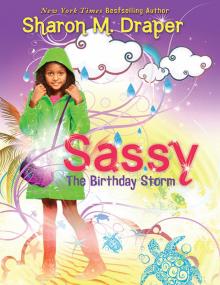 The Birthday Storm
The Birthday Storm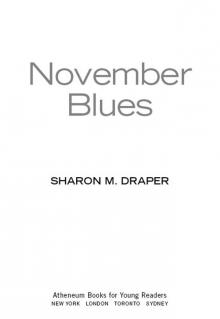 November Blues
November Blues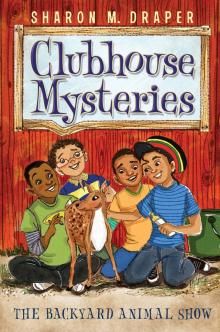 The Backyard Animal Show
The Backyard Animal Show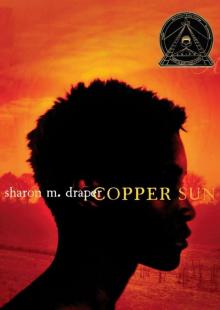 Copper Sun
Copper Sun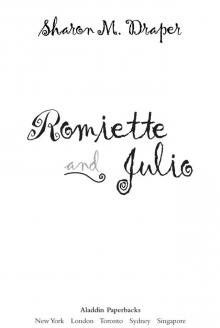 Romiette and Julio
Romiette and Julio The Sassy Collection
The Sassy Collection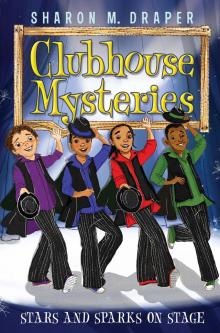 Stars and Sparks on Stage
Stars and Sparks on Stage The Battle of Jericho
The Battle of Jericho Tears of a Tiger
Tears of a Tiger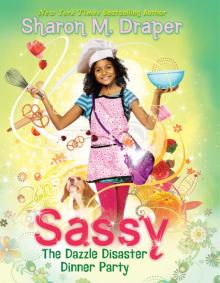 The Dazzle Disaster Dinner Party
The Dazzle Disaster Dinner Party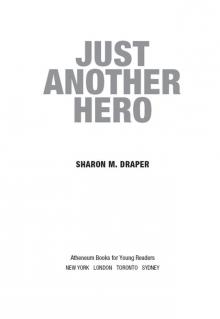 Just Another Hero
Just Another Hero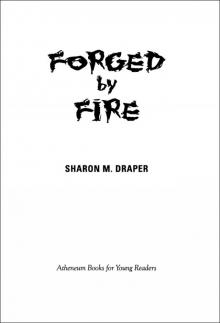 Forged by Fire
Forged by Fire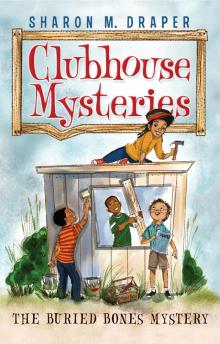 The Buried Bones Mystery
The Buried Bones Mystery Out of My Mind
Out of My Mind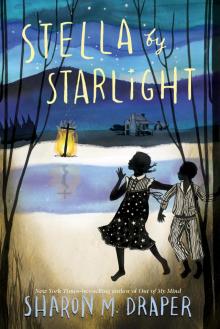 Stella by Starlight
Stella by Starlight Panic
Panic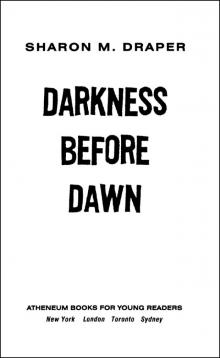 Darkness Before Dawn
Darkness Before Dawn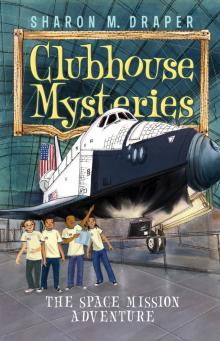 The Space Mission Adventure
The Space Mission Adventure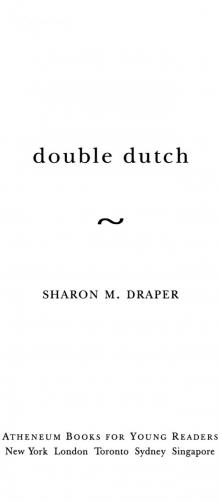 Double Dutch
Double Dutch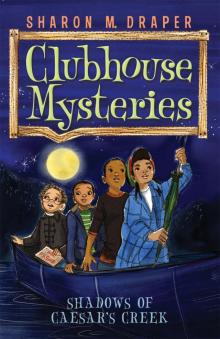 Shadows of Caesar's Creek
Shadows of Caesar's Creek